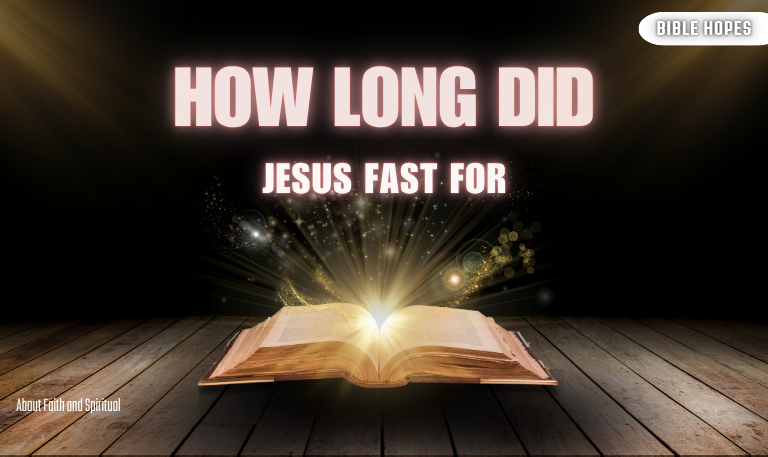Fasting is a profound spiritual practice that has shaped religious traditions across cultures and centuries. Among the most iconic fasts recorded in history is Jesus Christ’s fast in the wilderness, which many believers look to as a model for spiritual discipline and connection with God. But how long did Jesus fast for, and what deeper meaning does His fast hold for Christians today?
In this comprehensive guide, we will explore the biblical account of Jesus’ fast, its significance, historical context, and its ongoing relevance. This article draws upon scripture, theological insights, and modern interpretations to provide you with the most authoritative resource on the subject.
1. The Importance of Jesus’ Fast
Fasting, as a spiritual practice, serves as a powerful tool for focus, repentance, and deepening one’s relationship with God. Jesus’ fast is particularly significant because it took place immediately before He began His public ministry, symbolizing preparation and spiritual strength.
Understanding how long Jesus fasted is essential not only for biblical knowledge but also to comprehend the spiritual discipline and resilience He exemplified. This knowledge inspires believers to integrate fasting meaningfully into their own faith journeys.
Read Also: Holy Ghost Vs Holy Spirit
2. What Does the Bible Say About Jesus’ Fast?
The biblical narratives describing Jesus’ fast appear in three Gospels:
Matthew 4:1-2: “Then Jesus was led by the Spirit into the wilderness to be tempted by the devil. After fasting forty days and forty nights, he was hungry.”
Luke 4:1-2: “Jesus, full of the Holy Spirit, left the Jordan and was led by the Spirit into the wilderness, where for forty days he was tempted by the devil. He ate nothing during those days, and at the end of them he was hungry.”
Mark 1:12-13: This passage briefly mentions Jesus being in the wilderness for forty days, tempted by Satan, with wild animals, but doesn’t specify fasting details.
The consistent mention of forty days and forty nights fasting is central to understanding the event.
3. How Long Did Jesus Fast According to Scripture?
Scripture clearly states Jesus fasted for forty days and forty nights. This period, equating to roughly six weeks, is one of the longest fasts recorded in the Bible.
What does 40 days and 40 nights mean?
It indicates a continuous, intense fast during which Jesus abstained from food. While the Bible does not explicitly state if He drank water, many scholars infer that water consumption was allowed to sustain life, as total deprivation of both food and water for 40 days is biologically improbable.
4. The Significance of the Number 40 in the Bible
The number 40 appears repeatedly in the Bible, often symbolizing a period of testing, trial, or preparation:
Moses fasted 40 days on Mount Sinai before receiving the Ten Commandments (Exodus 34:28).
Elijah fasted 40 days traveling to Mount Horeb (1 Kings 19:8).
The Israelites wandered for 40 years in the wilderness (Numbers 14:33).
The flood lasted 40 days and nights in Noah’s time (Genesis 7:12).
Thus, Jesus’ 40-day fast connects to this biblical tradition of spiritual preparation and testing.
5. What Did Fasting Mean in Biblical Times?
Biblical fasting was typically an act of abstaining from food to focus on prayer, repentance, or seeking God’s guidance. The practice varied:
Partial fasting: Eating limited or specific foods (e.g., Daniel’s fast).
Absolute fasting: Abstaining from all food (and sometimes water) for a set period.
Jesus’ fast in the wilderness is understood as an absolute fast from food, highlighting spiritual readiness and dependence on God.
6. The Spiritual Purpose Behind Jesus’ Fast
Jesus’ fast was not just physical but deeply spiritual, serving multiple purposes:
Preparation for ministry: It was a time to align fully with God’s will.
Strengthening against temptation: The fast coincided with Satan’s temptations, testing Jesus’ resolve.
Modeling spiritual discipline: Setting an example for His followers on reliance on God.
This fast shows fasting as a means to deepen spiritual focus and readiness for God’s work.
7. The Temptation of Jesus During His Fast
While fasting, Jesus faced three key temptations from Satan, each challenging His identity and mission:
Turning stones into bread – testing His physical hunger and trust in God’s provision.
Jumping from the temple pinnacle – testing God’s protection.
Worshipping Satan for earthly power – testing His loyalty and purpose.
Jesus’ responses, quoting scripture, demonstrate the power of spiritual truth over physical need and temptation.
8. What Did Jesus Eat After Fasting?
The Bible doesn’t explicitly state what Jesus ate immediately after His fast, but Luke 4:2 mentions He ate nothing during those days and was hungry at the end.
Early Christian tradition and some scholars suggest:
Jesus likely broke His fast with simple, nourishing food, symbolizing renewal.
The act of breaking the fast holds spiritual symbolism of restoration and re-connection with the physical world after spiritual preparation.
9. Jesus’ Fast Compared to Other Biblical Figures
| Figure | Duration of Fast | Purpose | Biblical Reference |
|---|---|---|---|
| Jesus | 40 days and 40 nights | Preparation and resisting temptation | Matthew 4:1-2, Luke 4:1-2 |
| Moses | 40 days and 40 nights | Receiving the Law | Exodus 34:28 |
| Elijah | 40 days and 40 nights | Journey to Mount Horeb | 1 Kings 19:8 |
| David | Several fasts, varies | Repentance and crisis | 2 Samuel 12:16 |
| Daniel | 21 days (partial fast) | Seeking understanding and vision | Daniel 10:2-3 |
Jesus’ fast aligns with these significant moments of divine encounter and preparation.
10. The Role of Fasting in Christian Tradition
Jesus’ fast is foundational for Christian fasting traditions, especially:
Lent: The 40-day period before Easter commemorating Jesus’ fast and preparation.
Spiritual disciplines: Fasting is practiced for repentance, clarity, and seeking God’s guidance.
Varied practices: Different denominations observe fasting differently, from full fasts to partial or intermittent fasts.
11. Health and Spiritual Benefits of Fasting
Physical Benefits (Modern Science)
Detoxification and cellular repair
Improved metabolism and weight regulation
Enhanced mental clarity
Spiritual Benefits
Heightened prayer focus
Increased reliance on God
Breaking of unhealthy habits
Note: Always consult a healthcare professional before undertaking prolonged fasts.
Read Also: What Does the Bible Say About False Prophets
12. How Long Should Christians Fast Today?
Fasting duration varies:
Partial fasts: e.g., skipping meals, or Daniel fast for 21 days.
Intermittent fasts: 16-24 hours daily.
Extended fasts: Multiple days, often under supervision.
Christians are encouraged to fast according to their health, spiritual readiness, and guidance from scripture.
How Long Did Jesus Fast For FAQs
Q1: How many days did Jesus fast in the wilderness?
A: Jesus fasted for 40 days and 40 nights, according to Matthew 4:2 and Luke 4:2.
Q2: Did Jesus drink water during His fast?
A: The Bible doesn’t explicitly mention water intake, but many scholars believe Jesus drank water, as total deprivation of water for 40 days is unlikely.
Q3: Why is the number 40 significant in the Bible?
A: It represents periods of trial, testing, and preparation, such as Moses receiving the law and the Israelites wandering.
Q4: What type of fast did Jesus do?
A: Jesus performed an absolute fast from food for 40 days.
Q5: Can fasting bring you closer to God like Jesus?
A: Yes, fasting is a spiritual discipline designed to deepen dependence on God and enhance prayer focus.
Q6: Is fasting mandatory for Christians?
A: Fasting is encouraged but not mandated; it is a voluntary spiritual practice.
Q7: How to prepare for a fast like Jesus?
A: Begin with prayer, clear intentions, and gradually reduce food intake while ensuring physical readiness.
Q8: What happens if you break your fast early?
A: Breaking a fast is a personal choice; it is important to listen to your body and avoid harm.
Q9: How did Jesus survive 40 days without food?
A: Jesus’ fast was sustained by divine strength and possibly water intake; it was a miraculous act of obedience.
Q10: What is the spiritual meaning behind Jesus’ fasting?
A: It symbolizes reliance on God, preparation for mission, and victory over temptation.
Conclusion
Jesus’ 40-day fast in the wilderness stands as a powerful example of spiritual preparation, resilience, and unwavering faith. Whether you are considering fasting for the first time or deepening your spiritual disciplines, reflecting on Jesus’ fast offers valuable lessons in reliance on God and overcoming temptation. Remember, fasting is a personal and sacred journey—guided by faith, wisdom, and care for your health.



![15 Pink Bible Verses | Discover Meaning, Love [2025 Guide] 5 15-Pink-Bible-Verses-Discover-Meaning,-Love-[2025-Guide]](https://biblehopes.com/wp-content/uploads/2025/05/15-Pink-Bible-Verses-Discover-Meaning-Love-2025-Guide.png)